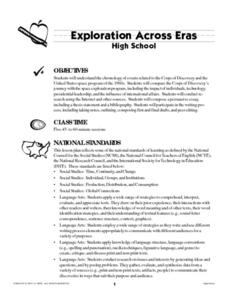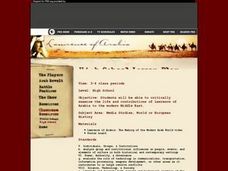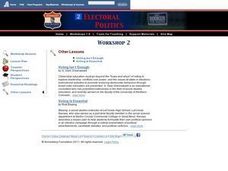Curated OER
Lose a Vote, Gain a Vote
Students explore the issues behind close Senatorial races. They investigate the qualities of political leaders, the 2002 senatorial elections and the differences and similarities between the Republican and Democratic parties.
Curated OER
Political Cartoons and Dr. Seuss
Students study political cartoons by Dr. Seuss. They create their own political cartoons on a current event.
Curated OER
Exploration Across Eras
High schoolers discover the chronology of events related to the Corps of Discovery and the United States space program of the 1960s. They compare the Corps of Discovery's journey with the space exploration program.
Curated OER
The Civil Rights Movement
High schoolers examine the Jim Crow Laws and goals of the Civil Rights movement. They read and discuss handouts, answer questions, conduct research, and write an essay about the effects of the Civil Rights movement.
Curated OER
The Role of Government and Citizens
Students define term representative democracy, explain how the government responds to the needs of its citizens, describe the role of citizens in a representative democracy, and explain how citizens can influence public policy.
Curated OER
Rwanda: You Go, Girls
Students examine the genocide that took place in Rwanda in 1994 and focus the post-genocide success of women. They study websites to examine how women are challenging their traditional roles in Rwandan society.
Curated OER
What is moral courage?
Students look at "Anne Frank Trust" winners' profiles and discuss what it means to have moral courage. They choose someone they would nominate for the Anne Frank Awards for Moral Courage.
Curated OER
Fit to Lead
Students assess the personalities of Ugandan politicians Yoweri Museveni and Nasser Ntege Sebaggala in the context of modern Ugandan politics, and decide which one might make a better leader of Uganda. Students then consider what their...
Curated OER
Turning Points of the American Revolution
Students identify the major events of the American Revolution. Using the internet, they research the Patriot cause and complete a chart discovering the strengths and weaknesses of each side. They also analyze the contributions of...
Curated OER
Laurence of Arabia
Students critically examine the life and contributions of Lawrence of Arabia to the modern Middle East. They view a video on Laurence of Arabia. Students discuss the movie. Students create a propaganda posters or stories identifying...
Curated OER
Similar And Different
Learners take part in a lesson that is composed of team building activities. They work in small groups in order to interview others to find information to point out similarities or differences. Students then take part in class discussion...
Curated OER
Ethical Dilemmas
Young scholars analyze anthropological case studies. In this specific Ethical Dilemmas lesson, students make ethical judgments based on the case study analysis. Young scholars work cooperatively in small groups to reach their conclusions.
Curated OER
Gender Shouldn't Limit You!
Students examine political gender biases. In this Teaching Tolerance instructional activity, students participate in a mock classroom election which requires them to vote for a boy or a girl. Students discuss the election results and...
Curated OER
The Byzantine Empire and the Rise of Russia
Eighth graders examine the Byzantine Empire and the rise of Russia. In this world history lesson plan, 8th graders complete a webquest that requires them to research the Hagia Sophia, Byzantine art, and Byzantine leadership.
Curated OER
What is Democracy?
Students explore the facets of democracy. In this civic responsibility activity, students create a definition of democracy and discuss the difference between a spectator and a participatory citizen. Students discuss whose...
Curated OER
Real People, Real Farms: Case Studies of Animal Agriculture
Students explore sustainable animal production. In this agriculture lesson, students examine how animal production is managed in the US and world. They apply this knowledge to real life situations by evaluating the sustainability of a...
Curated OER
Conducting the "Orchestra": How to Implement the Maestro
Students work as a team member to produce a newspaper. In this newspaper production lesson plan, students understand the role that each staff member plays in the production of a publication as they demonstrate commitment to the team’s...
Curated OER
Prairie Voices: Plum Grove
Students explore Plum Grove located in Iowa City. For this Iowa history lesson, students listen to their instructor present a lecture on the history of Plum Grove and the leadership of Robert Lucas. Students select assessment activities...
Curated OER
Cuban Missile Crisis
Eleventh graders determine how causation shaped the Cuban Missile Crisis. In this Cold War instructional activity, 11th graders examine photographs and documents related to the crisis and analyze the television address that President...
Curated OER
A Crossroads in Israel
Students explore Middle Eastern relations. In this current events lesson plan, students research the listed Web sites that include information about the history of the conflict between the Israelis and the Palestinians. Students...
Curated OER
Past and Present Turkey
Students compare and contrast modern-day Turkey with historical Ottoman culture. In this world civilization lesson, students create concept maps that allow them to compare the cultures, discuss leadership qualities, and create travel...
Curated OER
Similarities and Differences Between the American Revolutionary War and the American Civil War
Fifth graders describe three similarities and three differences between the American Revolutionary War and the American Civil War. They play a game comparing the two wars.
Curated OER
Voting Isn't Enough
Students compare and contrast their perceptions of politicians and leaders, analyze the consequences of negative public perceptions of politicians, and develop solutions to the problems caused by negative attitudes toward politics.
Curated OER
Westward Ho-- With Multiple intelligences
Young scholars acquire knowledge and literacy (through multiple intelligences) in social studies, language arts, science and math as we study the Oregon Trail. This type of lesson is strong in its attempt to be accessible to all learners.

























